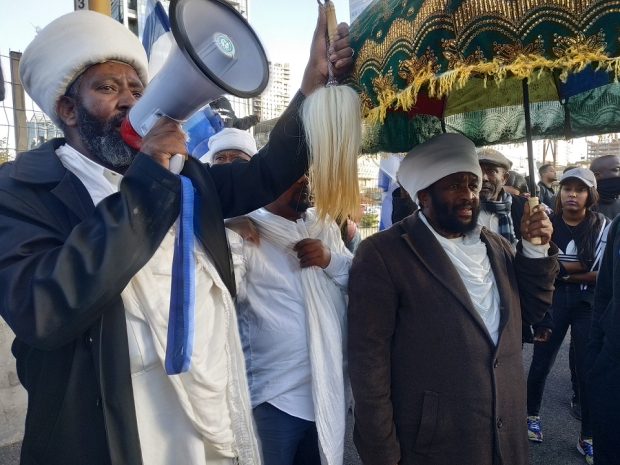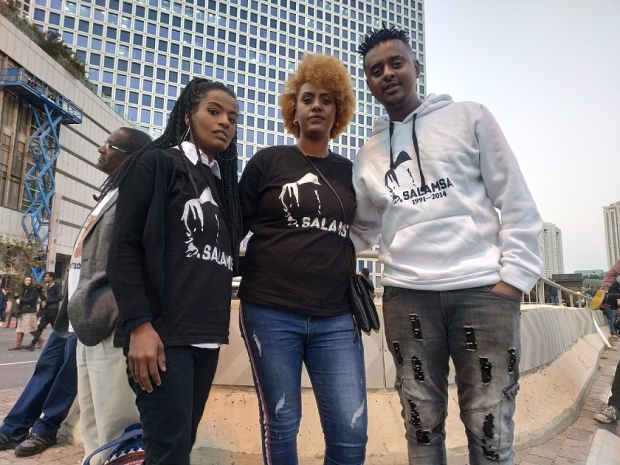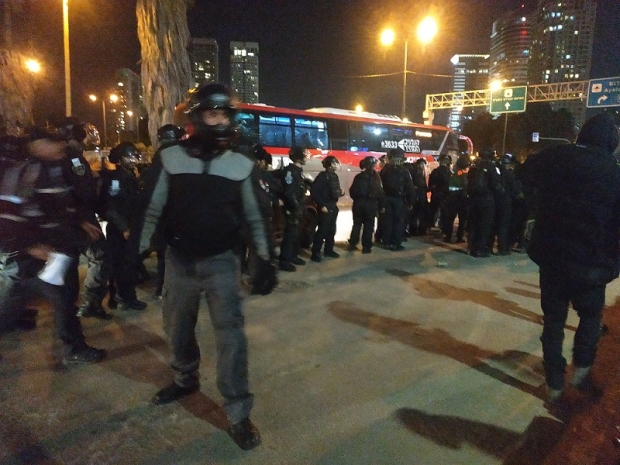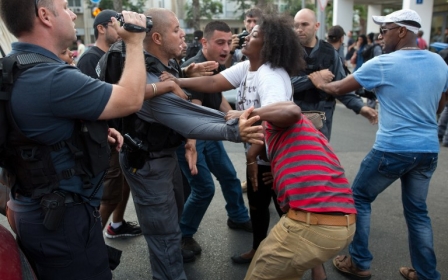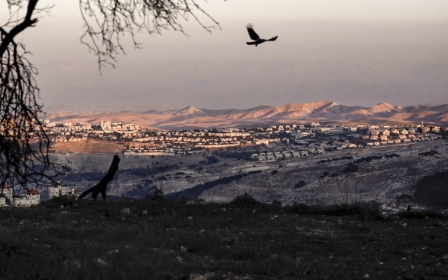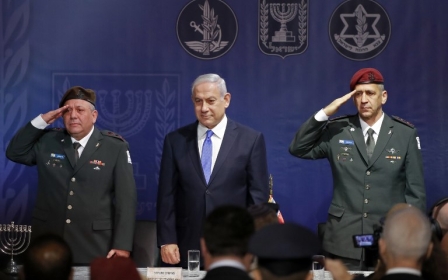Thousands of Israeli-Ethiopian protesters choke Tel Aviv over police brutality
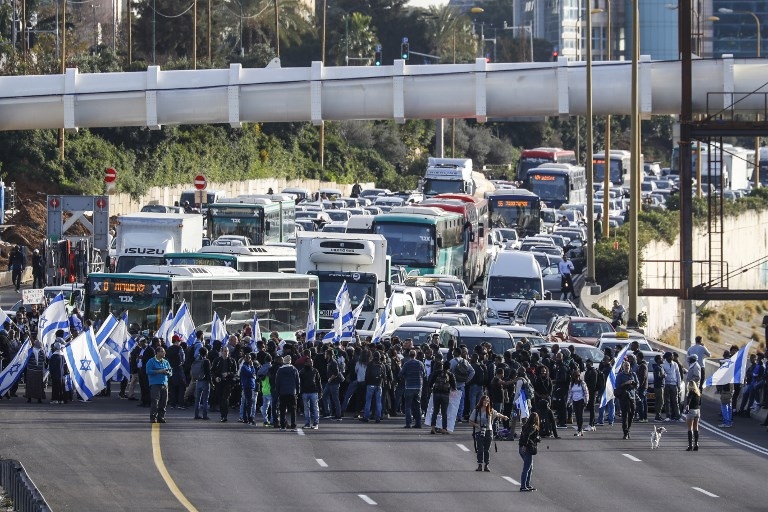
TEL AVIV – A major highway was blocked for hours on Wednesday as thousands of demonstrators protested police brutality against Israelis of Ethiopian descent after an officer killed a 24-year-old earlier this month.
On 18 January, Yehuda Biadga was walking around his neighborhood in Bat Yam, just south of Tel Aviv, holding a knife.
'To be Ethiopian in this country is to be disabled. You encounter obstacles wherever you go.'
- Connie Angade, immigration researcher and protester
His parents called the police for help, reportedly warning that he suffered from a mental disorder and had not taken his medication.
When police arrived 50 minutes after the initial call, an officer, who said he believed his life was in danger, shot Biadga as he approached. He died within minutes. Family members said he had been dealing with trauma following his service in the Israeli military.
The shooting, now under a police investigation, has sparked a major outcry among Israelis of Ethiopian descent who have long held that police discrimination and mistreatment of their community is systemic and institutionalised in the country.
On Wednesday, thousands of members of Israel’s Ethiopian community marched through the streets of Tel Aviv from afternoon into the evening.
"They prejudge our legitimacy," said Efrat Yerday, an activist and university lecturer, who participated in the protest. "That there will be no doubt about who started the violence."
Yerday said Israel has “no civil society at all”, making it hard to distinguish the establishment from its citizenry. “We are so used to wars that we do not know how to deal with civilian situations,” she said.
'We are so used to wars that we do not know how to deal with civilian situations'
- Efrat Yerday, activist and university lecturer
The officer who killed Biadga, she added, was informed about his situation and should have followed open-fire regulations.
“The first to get hurt in such cases are the weakest people and the people who are at the lowest level, like Ethiopians, who usually have no such strong families who can turn tables,” Yerday said.
This was not the first mass demonstration over police brutality against Israelis of Ethiopian descent. In 2015, major protests were sparked after Damas Pikada, an Israeli soldier, was beaten by police officers when he refused to move his bicycle.
His beating, captured on video, came a year after the death of Yosef Salamsa, a 23-year-old Ethiopian-Israeli, who was arrested and tasered while sitting with friends on a public bench.
After he filed a complaint over the incident, police officers began to arrive at his home and threaten his family, members of the family have said. Salmasa was found dead several months later. The police closed his case, but the questions still remain.
“Every day, every hour, we’ve been fighting for five years,” she said. “I don’t want to worry anymore about my daughters when they come back from school. I do not want to do a U-turn anymore when I see a policeman in the distance.”
Franus Salmasa, Yosef’s mother, asked all of the young people at the demonstration to return home safely. “I hug you, I'm with you. The people of Israel - the blood of our children is the blood of your children ... It's most important to me that everyone here today goes home safely."
'Every day, every hour, we’ve been fighting for five years'
- Banchiamlack Salmasa, Yosef Salmasa's sister
Other demonstrators told stories about difficult experiences they had with the police. One young Israeli-Ethiopian man who serves in the military and lives near Biadge’s family, said he is regularly searched spontaneously by the police and stared at on the street.
"Even when I'm in my uniform coming back from the base, sometimes I get mothers with their babies, staring at me as if I was dangerous. What will I do? I'm a soldier. I serve the country. I have nothing to hurt you,” said the man who preferred to stay anonymous for his safety.
Last week, he said, he went to Bat Yam and was standing at a traffic light when a police officer “leapt out of nowhere and checked me out”.
“I did not think police would come back to treat us that way so quickly, after the incident,” he said. “He did his search and everyone looks at me like I did something. It’s very humiliating.”
The soldier’s experiences do not come from a place of Isolation: at a 2016 meeting of the Israeli Bar Association, police commissioner Roni Alshich reportedly told a group of lawyers that it was “natural” for police to be suspicious of Ethiopians and Arabs.
Connie Angade, an immigration researcher, said she was disappointed that more non-Ethiopian citizens hadn’t joined the protest.
"We feel like an addendum to the society and not a part of it,” she said. “I expected and hoped that we would see a few more colours, that the rift will begin to heal somehow.”
She noted that more than 50 percent of Ethiopian families in Israel live under the poverty line, and the members of the community feel racism in all aspects of their life from education institutions to employment bureaus.
“To be Ethiopian in this country is to be disabled. You encounter obstacles wherever you go,” she said. “There's only one place where our colour is gone, and that's the Israel Defense Forces. There, we can serve and die at wars like everyone else.”
After the rally, a group of protesters spontaneously blocked the Ayalon Highway again. Around 9pm, demonstrators were violently dispersed by border police officers.
This article is available in French on Middle East Eye French edition.
New MEE newsletter: Jerusalem Dispatch
Sign up to get the latest insights and analysis on Israel-Palestine, alongside Turkey Unpacked and other MEE newsletters
Middle East Eye delivers independent and unrivalled coverage and analysis of the Middle East, North Africa and beyond. To learn more about republishing this content and the associated fees, please fill out this form. More about MEE can be found here.


